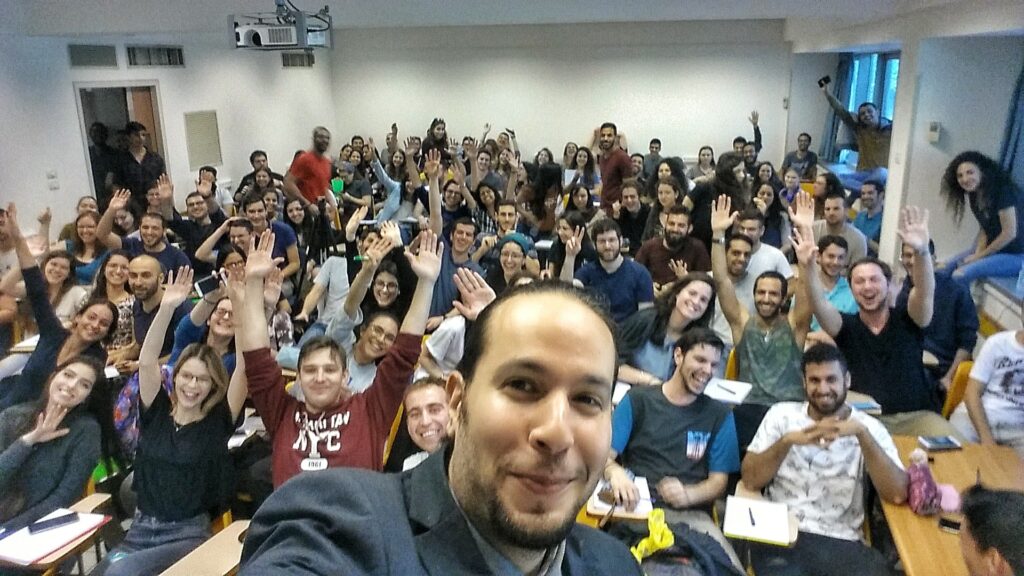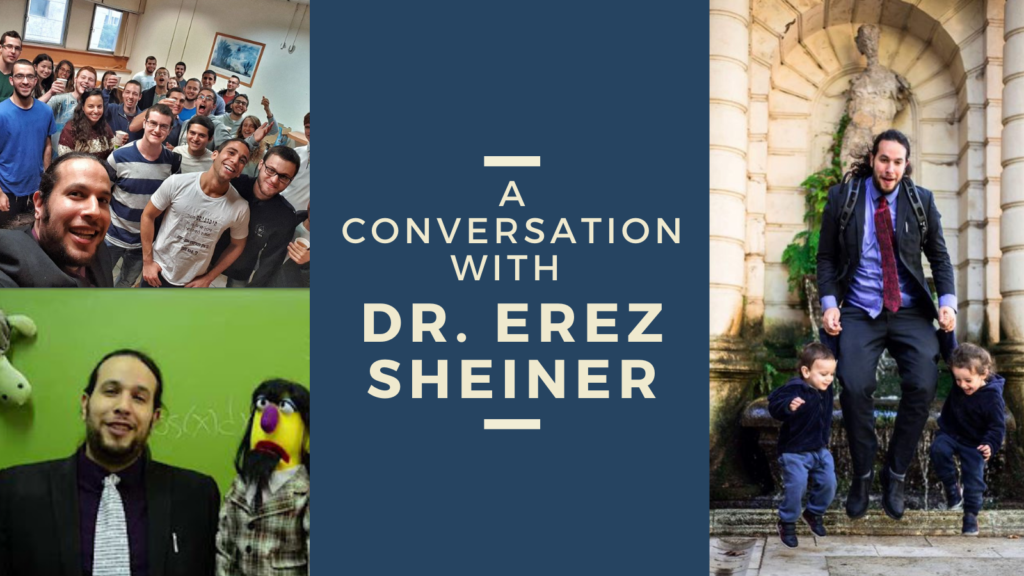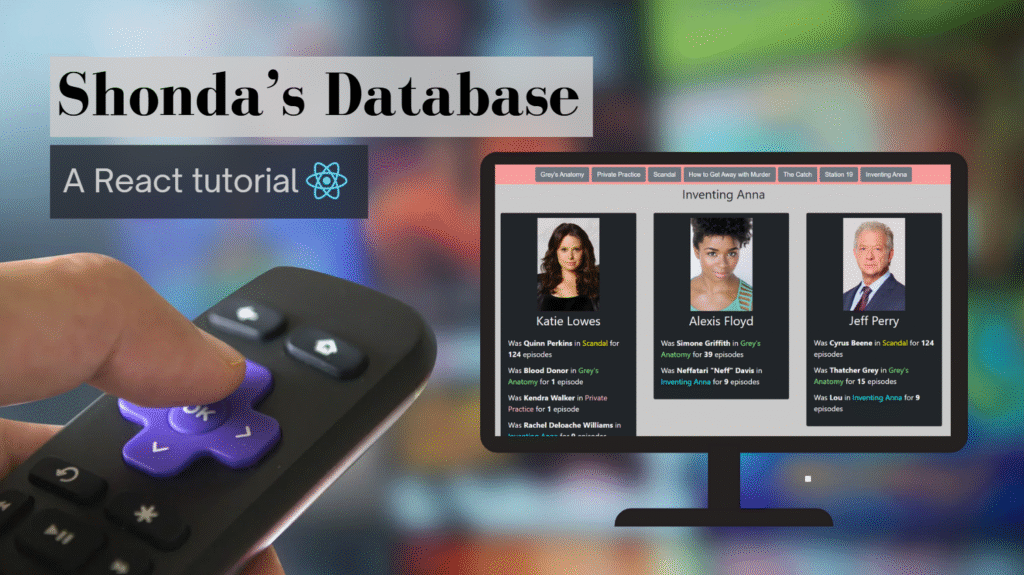The responses I received from my friends to “I’m about to interview Erez Sheiner for the blog” were as follows: People who didn’t know Erez wondered what does it have to do with Cup of Code and people who did know, were thrilled to see the final result.
Dr. Erez Sheiner is a lecturer in the math department of Bar Ilan University. He teaches in the CS (computer science) department as well, where he wins “best lecturer” almost every semester. Erez also has a successful youtube channel dedicated to math and a TikTok account! On Facebook, he is a top fan of the popular page — BIU (Bar-Ilan University) confessions. This page posts anonymous messages and people comment on them, and you get a top fan badge if you are active and comment a lot.
I told you he is not your ordinary lecturer. This is an exciting opportunity to ask so many questions! So now you know why I was so curious.
Don’t miss the last blog-post, where we talked about academia, student life, short-term boot camps, work-life balance, and more!
I’ll start with a question that isn’t specifically about you, but I was curious about: We see you teaching in class — but what does your typical day look like?
I, unlike most of the professors, am in a teaching position and not research. This means that most of my activity is teaching.
Also, well… One might not call this research but I constantly try to find new ways to prove lemmas and write new exercises. I’ve recently built some cool mini-games for the game theory class I gave to high schoolers.
I actually saw that lecture you mentioned, after getting recommendations from a friend.
Oh really? And did you see how amazing they are? How they participate? Because it is a chosen course and not mandatory, I only have students that want to be there. Also, these are high schoolers so they are young and energetic, and don’t give me the feeling that they do me a favor by showing up to class.
Well, about that: Where do you find the motivation to invest time and effort in us, when students often give the feeling they don’t care to listen?
Well, the answer is quite simple — narcissism. I love seeing the student’s feedback at the end of the year. Some professors really don’t care, but I feel like you are my children, and your success is my success. This is my goal in life. This is what makes me happy.
Speaking of goal in life, I read you said in the past “with time, knowledge is becoming easier to access, but the teacher’s job — to inspire — will remain forever”. Do you remember the moment it transferred from “teaching is a mandatory part of my job” to “teaching is my destiny”?
Teaching has always been my destiny. I remember myself as a teenager in an educational movement for young people. One day I had two lectures to give. The first group started the lesson thinking A, and I shifted them to think B. The second group was the other way around — started thinking B and switched to thinking A! It fascinated me, realizing how much power teaching can have and how impactful you can be.
Truth be told, it doesn’t matter if my day started bad — the moment I enter a classroom I shine. I don’t wake up in the morning hating my day. Well, I don’t like checking exams, but I do enjoy the teaching part.
For the next question, I’m gonna quote your toddler Loei, and ask: “Why are you working? You already received an award”. By that I mean — you already reached the peak, so what motivates you to keep going?
I did not reach the end goal! I’m far from it! When I receive the students’ feedback at the end of the semester, I make sure to read the negative ones, so I can improve.
More than that, our education systems did not reach the end goal, so how can I? Besides, I do what I do because I love it, not to reach some goals. Every year I try to improve something, I don’t just follow old notes without thinking.
Ok, here is the question I kept for 4 years: Why are you wearing suits?! Every day, no matter the temperature outside!
Well, this was a process. I always liked formal wear. It started with wearing T-shirts and ties, then it became a button-up shirt and a tie, and then the 3 piece suit you’ve seen me in, in the university.
With that said, there are things that I believe are too much, like a butterfly tie. You’ll never see me wearing a butterfly tie.
Is a butterfly tie too much? I’m pretty sure the 3 piece suit is already too much.
Is it? It doesn’t feel too much for me. This is how people on TV dress up.
To be honest, I don’t understand why people care about outfits. For me it’s transparent. I am aware of the fact that people see me, but I dress for myself.
Speaking of people seeing you: You give lectures at University and also on your highly viewed youtube channel. Does it ever worry you that you will make mistakes or say something incorrect?
Absolutely not, and not because I can’t be wrong. Because a professor solves the given problem easily, it seems like he is some kind of a magician. Truth is, he solved it easily not because he knows everything, but because he came prepared. I think it’s important to show students HOW you approach a problem, and not just how to solve it.
On the other hand, psychologically it’s hard for students to see their professor making a mistake — because then they think it is the hardest problem that exists. This is a shame because that’s not true.
Continuing the topic of fear, what about potential mistakes that don’t regard your teaching? About a decade ago, you participated in the Israeli version of the reality TV show “Come Dine With Me”. Aren’t you afraid of the consequences of participating in a reality TV show, or taking this interview, where you don’t have control over the output?
The decision to participate in this TV show was stupidity, not courage. I can’t bring myself to watch it again, both because I hate how they edited it and also because I said things I wouldn’t say today.
In the long term it’s not such a big deal because it doesn’t harm me in any way, only creates some buzz. In Bar Ilan, I gave a lecture about my anxiety, and on social media, I make effort to show the negative as well. It’s important to me to show that we are all humans and nothing is perfect. I know there are students that look up to me, and I want to show them it’s not unreachable.
You mentioned social media. You are very active on a Facebook page named “BIU confessions”, where people post anonymous questions and thoughts. One comment you wrote really stuck with me. Someone was anonymously sharing his frustration that he didn’t find the woman that he will know is his soulmate at first sight. To that, you responded: “a soulmate isn’t found, she is made. It’s your journey together that makes her your soulmate”
I’m glad to hear that. That’s also why I love teaching because people interpret it and apply it to their own lives.
With that said, aren’t you afraid that being active on social media will lower the respect for you among your students?
I never had distance from students. Respect is not earned from the title. I think the majority of the students appreciate it when you get to their level.
The posts on this page are about ALL subjects, including inappropriate ones. Are there any red lines you decided for yourself that you won’t cross?
This is an issue I find myself wondering about. I ask for my wife’s opinion sometimes. A general guideline is not to be too aggressive and not to harass anyone. I check myself based on the feedback I receive.
Also, I try not to get into arguments, and if I do — I say something objective. To be clear, I am not afraid that I’ll embarrass myself, but I worry that I’ll make someone else feel uncomfortable.
Aren’t you concerned by the fact that you are the only lecturer that is communicating with us on social media?
Why should I be concerned? It’s amazing!

[source: https://www.facebook.com/sheiner]But you are the only one. Maybe it’s not professional?
Being friendly with my students on Facebook doesn’t mean I’m not giving them the grades that reflect their knowledge. I am professional, and I have proof of it. There are people out there who think it’s inappropriate, but the people who matter — to me and to my career — don’t think so. They appreciate me and I don’t mind about the rest.
As I mentioned before, I’ve started watching your game theory course. I’ve noticed something that I don’t remember as a student— this time there was more effort making gender-equal language and examples (note for readers: The Hebrew language is gendered).
Yes, it is pretty new. But it’s not just me changing, it’s the whole world. The conversation online has developed and I read. I learn, I fix where I can, but I won’t define myself as a feminism activist. Also, there are things people are doing that I think are extreme, like sending a boy in a dress to school. They do it for their agenda and the kid will pay the price.
Last question: While watching your youtube videos, I couldn’t help but wonder — why are you giving it for free? You have good content and you can make money out of it.
I do not believe that sharing for free takes something from me. For example, we have full-length university lectures recorded and uploaded to YouTube for students that couldn’t or didn’t want to come to class (pre-COVID19 era). The ones against this idea said that this action will make the classrooms empty, but it’s not true, my classrooms are still full. As in music, live performance is better than the record, even though the record is better quality.
Besides, there are benefits that are not financial, like being recognized in the streets, or knowing that my videos help students. I believe we should spread knowledge as much as possible. Money isn’t everything.
What a great way to end this interview! I also believe in spreading knowledge and helping each other. This is what I’m doing here on my blog. I hope you enjoyed reading this at least as much as I enjoyed talking to Erez.
Thank you!







